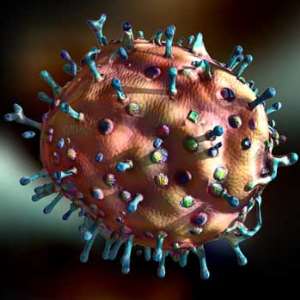
What could have caused the mindset in hundreds of thousands of people over many generations with plans to keep them in the state of thousands of years?
What made and makes people consent to build pyramids, temples, and cathedrals, to wander in the desert for 40 years, to live as slaves to submit to humiliation as the serfs of the Russian Grand Dukes, and the English, French, Belgium, German, and Danish aristocracy?
What could have perverted German and French soldiers to such an extent that 550,000 spent months killing each other, e.g.at Verdun in 1916? The long term hereditary measure that could enslave generations of people is probably the activation of bornavirus, the family of pathogens that cause so-called 'Hitzige Kopfkrnkheit der Pferde - equine excitable cerebral disease.'
The name was given to this clinical picture when it was first described in Germany in 1813. In horses, sheep and other domestic animals, bornavirus cause depression or agitation, sensory processing disorders; it also causes changes in parrots and ostriches.
Since 1985, reports have been published suggesting that psychiatric disease in humans could be associated with bornavirus infection. Bornavirus most commonly affects the brain's 'hippocampus structure. This singularly appropriate name means 'horse region or horse monster.'
The hippocampus is the terminal point for nerve fibers that come directly from the nasal cavity and stores impulses they send. If bornavirus is activated in humans, it can turn sociable behavior, prudence, consideration, sympathy, and seriousness into submission, anxiety, indecisiveness, despair, and depression.
If structures are inhibited these attributes can turn into lust for power, foolhardiness, lack of consideration, cruelty, or mania. Once activated, bornavirus can strengthen attributes normally ascribed to women rather than men.
The activation of bornavirus can cause wild animals to become domesticated. Dogs, cattle, sheep, horses, cats, house rats, house mice, ostriches, and parrots are all bornavirus carriers. Bornavirus changes that flight behavior towards humans, which controlled by olfactory stimuli.
The instinct of young animals to run away from humans could have been destroyed coincidentally and, in ancient Egypt, also deliberately.




 Former Kotoko Player George Asare elected SRC President at PUG Law Faculty
Former Kotoko Player George Asare elected SRC President at PUG Law Faculty
 2024 elections: Consider ‘dumsor’ when casting your votes; NPP deserves less — P...
2024 elections: Consider ‘dumsor’ when casting your votes; NPP deserves less — P...
 You have no grounds to call Mahama incompetent; you’ve failed — Prof. Marfo blas...
You have no grounds to call Mahama incompetent; you’ve failed — Prof. Marfo blas...
 2024 elections: NPP creates better policies for people like us; we’ll vote for B...
2024 elections: NPP creates better policies for people like us; we’ll vote for B...
 Don’t exchange your life for wealth; a sparkle of fire can be your end — Gender ...
Don’t exchange your life for wealth; a sparkle of fire can be your end — Gender ...
 Ghana’s newly installed Poland train reportedly involved in accident while on a ...
Ghana’s newly installed Poland train reportedly involved in accident while on a ...
 Chieftaincy disputes: Government imposes 4pm to 7am curfew on Sampa township
Chieftaincy disputes: Government imposes 4pm to 7am curfew on Sampa township
 Franklin Cudjoe fumes at unaccountable wasteful executive living large at the ex...
Franklin Cudjoe fumes at unaccountable wasteful executive living large at the ex...
 I'll 'stoop too low' for votes; I'm never moved by your propaganda — Oquaye Jnr ...
I'll 'stoop too low' for votes; I'm never moved by your propaganda — Oquaye Jnr ...
 Kumasi Thermal Plant commissioning: I pray God opens the eyes of leaders who don...
Kumasi Thermal Plant commissioning: I pray God opens the eyes of leaders who don...
